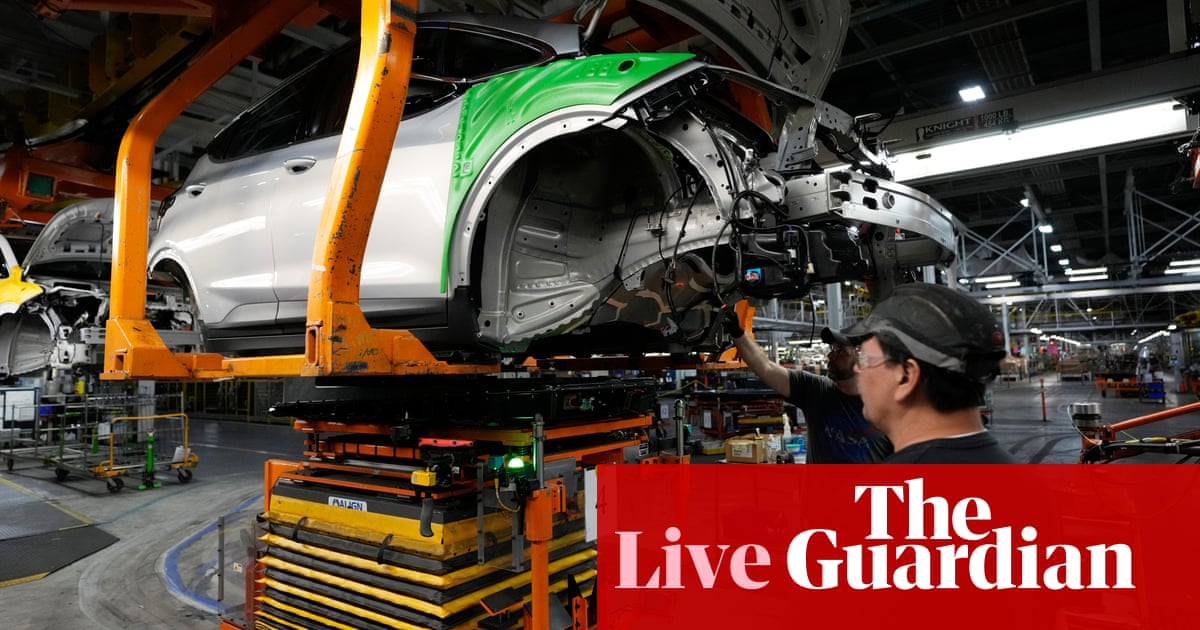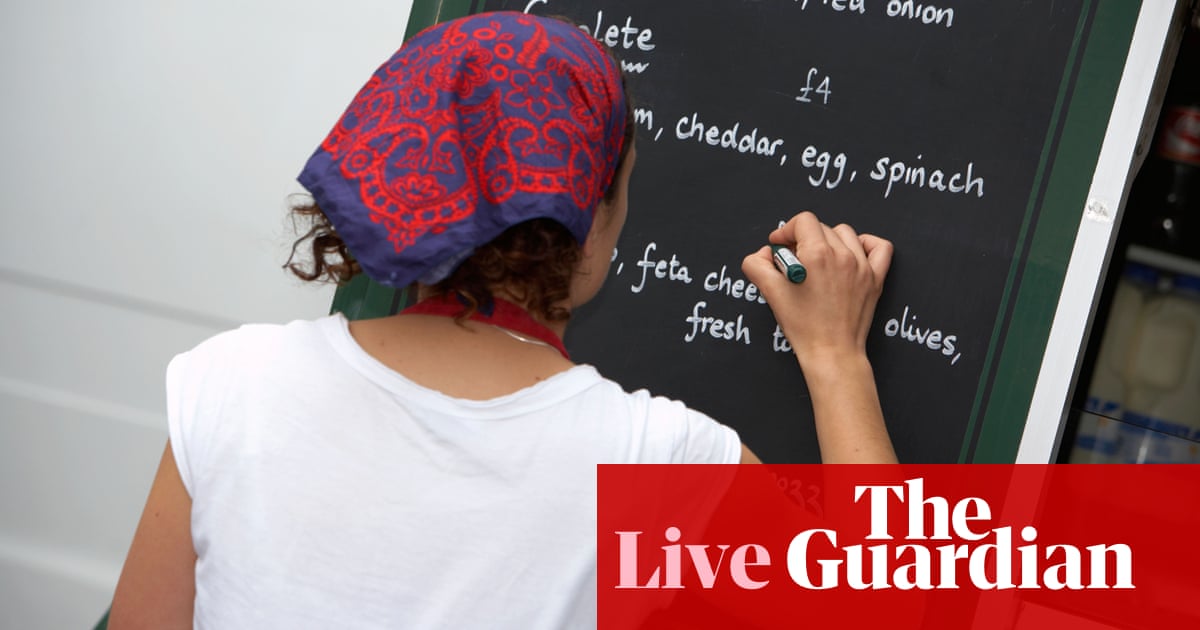
Closing summary
Time to wrap up, after another day dominated by the economic pain of the coronavirus.
Hong Kong’s economy has suffered its worst slump on record. GDP across the city state shrank by 5.3% in the first quarter of this year, extending its recession.
The economy was 8.9% smaller than a year ago, as the pro-democracy protests and the US-China trade war also hit growth in recent months.
Stock markets have dropped, after Donald Trump intensified his criticism of China over the coronavirus - and suggested he could impose new trade tariffs. Beijing has rejected the White House’s claim that Covid-19 began in a Wuhan lab.
America’s manufacturing sector has been badly hit by the ongoing lockdowns, with new factory orders tumbling over 10% in March.
The lockdown has also pushed US fashion retailer J Crew into Chapter 11 bankruptcy protection, and prompted meat processing giant Tyson to warn of further disruption.
Shares in US airlines have fallen after billionaire investor Warren Buffett revealed he has sold up. Investors in Norwegian Air have approved a rescue package.
Goodnight. GW
More bad news: America’s General Electric is cutting as many as 13,000 jobs in its jet engine business.
GE has announced it is accelerating its cost-cutting programme, and permanently reducing the Aviation division’s global workforce by as much as 25% this year. The plan will include voluntary redundancies and compulsory layoffs, as the company reels from the shock of Covid-19.
GE blamed the “unprecedented” and “deep contraction” of the commercial aviation business, with GE Aviation CEO David Joyce telling staff that:
“[The] deep contraction of commercial aviation is unprecedented, affecting every customer worldwide. Global traffic is expected to be down approximately 80% in the second quarter.”
Although Britain’s FTSE 100 only dropped 0.15% today, there are some chunky risers and fallers out there.
The losers column is dominated by travel companies - with British Airways parent company IAG down 5% and easyJet losing 7.2%. Betting firm Flutter fell 4.9%, amid signs that UK sporting events will remain disrupted for some time.
Top risers included pharmaceuticals firms Hikma (+5.8%) and GSK (+3.2%), and online grocer Ocado (+4.45% to a new closing high).
In these extraordinary times, the Guardian’s editorial independence has never been more important. Because no one sets our agenda, or edits our editor, we can keep delivering quality, trustworthy, fact-checked journalism each and every day. Free from commercial or political bias, we can report fearlessly on world events and challenge those in power.
Your support protects the Guardian’s independence. We believe every one of us deserves equal access to accurate news and calm explanation. No matter how unpredictable the future feels, we will remain with you, delivering high quality news so we can all make critical decisions about our lives, health and security – based on fact, not fiction.
Support the Guardian from as little as $1 – and it only takes a minute. Thank you.
European markets close lower
Europe’s stock markets have ended the day with solid losses.
Worries that the US-China trade dispute might flare up again, amid Covid-19 recriminations, knocked all the major indices lower.
After being on holiday on Friday, EU investors were also keen to catch up on last week’s late selloff in London and New York.
Here’s the damage:
German DAX: down 394 points or 3.9% at 10,466
French CAC: down 193 points or 4.2% at 4,378
Italian FTSE MIB: down 654 points or 3.7% at 17,035
Spanish IBEX: down 259 points or 3.6% at 6,673
The weak pound propped up major shares in London, though, where the FTSE 100 index only ended 9 points lower at 5,753.
In New York, the Dow is still down - off 0.7% - but the technology-focused Nasdaq has gained 0.8%.
Edward Moya of trading firm OANDA explains:
‘Sell in May’ continues as airlines get dumped, US-China tensions are back, and as the virus spread accelerates in some parts of the US as many states begin reopening. Reopening doubts are growing after President Trump had to acknowledge the virus was more lethal than initially thought. Trump, known for being overly optimistic, now sees the death toll from the coronavirus reaching as high as 100,000 in the US.
The reason financial markets are not substantially lower is because tech giants are surging higher. Not everyone is Warren Buffett and will sit on a huge pile of cash. Investors are jumping out of airlines, financials and real estate and overloading on big-tech. Airlines might not see a return to prior crisis levels for a couple years and low interest rates are here for the foreseeable future.
Good news for those nursing a sweet tooth through the lockdown -- high-end confectionery chain Hotel Chocolat is planning to reopen a few stores next week.
My colleague Sarah Butler explains:
Hotel Chocolat is to reopen up to five stores next week – for takeaways only – after restarting production at its UK factory to help top up dwindling supplies.
The specialist retailer and cafe operator said it will reopen first in Borough Market in London, serving hot chocolates, ice-creams and coffees, as it tests out new ways of working while protecting staff and customers from the spread of the coronavirus.
The UK government has just reported that 6.3 million workers have been furloughed since the coronavirus crisis began.
That’s nearly a fifth of Britain’s total workforce, I estimate (the employment total hit 33.07m in February).
German car market are also feeling extremely worried about the future, due to the Covid-19 lockdown.
A survey of the business climate in Germany’s auto sector suffered its biggest slump in April, dropping from -13.2 to -85.4 -- the worst since the survey began in 1991.
“We have never seen such bad figures for this key sector,” said Klaus Wohlrabe, head of forecasting at Ifo, which produced the report.
Bosses at German carmakers reported that orders, production expectations and export hopes all tumbled.
More reaction to the tumble in demand for US factory goods:
New orders for U.S.-made goods fell more than expected in March and could sink further as disruptions from the novel coronavirus fracture supply chains and depress exports.
The Commerce Department said on Monday factory orders dropped 10.3%. Data for February was revised down to show orders dipping 0.1% instead of being unchanged as previously reported. Economists polled by Reuters had forecast factory orders tumbling 9.7% in March.
US factory orders slump 10.3%
Newsflash: America has suffered the biggest slump in factory orders on record.
New factory orders fell by 10.3% in March. That’s worst than expected, and the biggest decline on record.
It tells us what we already knew -- America’s economy is in a severe slump due to the global coronavirus pandemic, with weak demand from abroad and at home due to lockdowns and physical distancing.
As feared, airline stocks are falling sharply after Warren Buffett revealed he’d sold his stakes in the industry.
American Airlines and SouthWest are down 6%, United has dropped 7% and Delta has lost 8%.
Boeing is suffering too, down 4% as traders anticipate that demand for new planes will be weak for some time.
Wall Street drops 1% amid US-China worries
The US stock market has opened lower, as fears of a new US-China trade war weigh on Wall Street.
The Dow Jones industrial average has dropped 1% in early trading, down 245 points at 23,478.
That extends Friday’s 622-point slide, meaning May has got off to poor start.
Investors are anxious that the White House may impose new tariffs on China, given Donald Trump’s latest criticism of Beijing’s handling of the coronavirus crisis.
Rupert Thompson, chief investment officer at Kingswood, says the markets are returning to early after a sizzling rally in April.
The sour market mood of the last couple of days has been triggered most obviously by the ratcheting up of tensions between the US and China. The US is now blaming China for a cover-up and even asserting the virus was developed in a Chinese lab. Trade tariffs, which were a major concern for the market for most of last year, are once again back in the headlines, with Trump now threatening to impose new tariffs on China.
However, the latest market falls are also in part no real surprise given the strength of the rebound with markets gaining more than 25% in little more than a month. The recovery was the sharpest ever out of a bear market and has looked overdone.
A stock market wobble is usually a busy time for Warren Buffett - the man who became super rich by being greedy when others are fearful (and vice versa).
But not this time. Buffett told shareholders at his Berkshire Hathaway annual meeting that deal opportunities melted away after the US Federal Reserve announced its rescue packages last month.
Buffett explained that the Fed’s offers of huge, low-priced loans to help firms through the crisis meant his own chequebook wasn’t needed.
“There was a period right before the Fed acted, we were starting to get calls. They weren’t attractive calls, but we were getting calls.
And the companies we were getting calls from, after the Fed acted, a number of them were able to get money in the public market frankly at terms we wouldn’t have given.”
This means Buffett is still sitting on a huge pile of cash - especially now he’s sold his airlines shares. He reckons current valuations aren’t attractive -- perhaps a sign that the market is going to head lower?...
The covid-19 pandemic has pushed fashion chain J Crew to seek bankruptcy protection.
Known for its ‘preppy’ range of mens and womenswear, J Crew has become the first major US retailer to be brought down by the virus.
Demand for its sweaters, t-shirts, trousers and pencil skirts has slumped since shops were forced to close - and millions of Americans lost their jobs.
Tyson Foods warns of Covid-19 impact
Over in the US, meat processing giant Tyson Foods has warned that the Covid-19 pandemic will hurt its business this year.
Tyson, a massive producer of chicken, beef and pork, has reported a 15% drop in profits in the last quarter - from $1.17 per share to $1. That’s below forecasts.
Tyson also told shareholders that its operations will be disrupted by the pandemic for some time:
Given the nature of our business, demand for food and protein may shift amongst sales channels and experience short-term disruptions, but over time we expect worldwide demand to continue to increase. We are experiencing multiple challenges related to the pandemic. These challenges are anticipated to increase our operating costs and negatively impact our volumes for the remainder of fiscal 2020.
Operationally, we have and expect to continue to face slowdowns and temporary idling of production facilities from team member shortages or choices we make to ensure operational safety. The lower levels of productivity and higher costs of production we have experienced will likely continue in the short term until the effects of COVID-19 diminishes.
Tyson has suspended operations at several plants in recent weeks, because workers contracted the virus. At one pork processing site in Indiana, almost 40% of staff were ill.
Workers and unions have accused America’s food industry of failing to protect workers, not supplying protective equipment, and covering up illnesses.
Staff say they were unable to take time off when ill, because they wouldn’t get paid - meaning viruses quickly spread across production lines.
Shares are down 5% in pre-market trading.
Feeling worried about life? You’re not alone.
More than 25 million people reported high levels of anxiety in late March as the decision to put the UK into lockdown triggered fears about health, job security and making ends meet among half the country’s adult population.
The Office for National Statistics (ONS) said its regular update on wellbeing showed a more than doubling since late 2019 in the number of people over 16 reporting deep levels of concern and stress.












